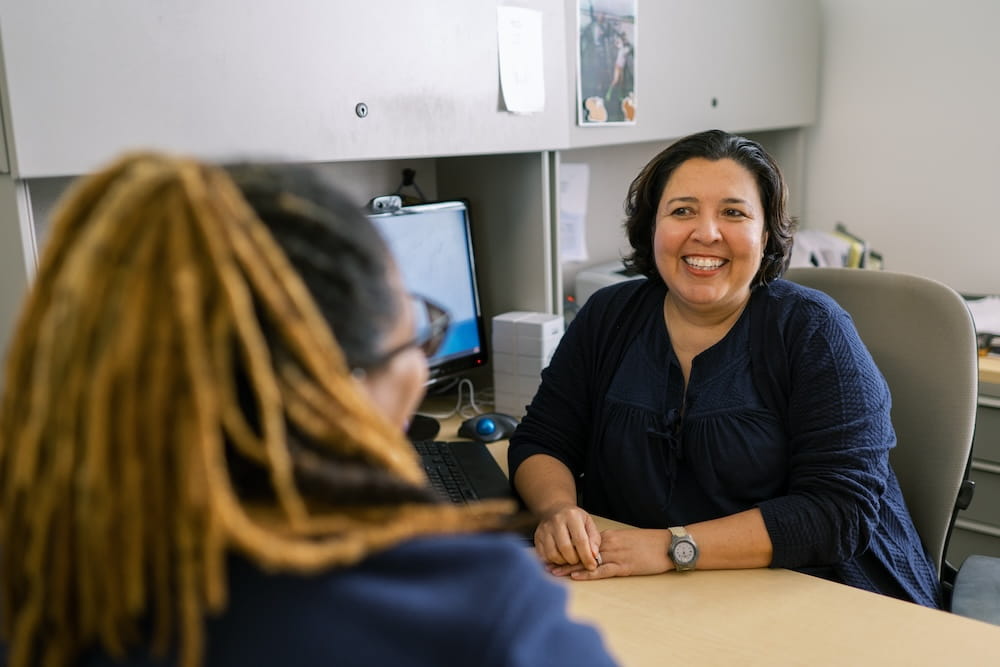Historically, South Carolina has had some of the highest rates of intimate partner violence, or IPV, in the U.S. IPV encompasses any physical or sexual violence, stalking and psychological aggression by a current or previous partner or spouse.
"There is an epidemic of intimate partner violence in South Carolina," said Leslie A. Lenert, M.D., associate provost of Data Science and Informatics and director of the Biomedical Informatics Center at the Medical University of South Carolina.
"We aim to make the doctor's office a safe place where women can discuss IPV with their provider and move forward with the difficult task of escaping an abusive relationship."-- Dr. Leslie Lenert
To address that epidemic, Lenert partnered with clinical psychologist Alyssa A. Rheingold, Ph.D., family physician Vanessa Diaz, M.D., and health services researcher Kit N. Simpson, DrPH, to develop electronic health record (EHR)-based screening for IPV, with funding from the Agency for Healthcare Quality and Research. They report in JAMA Network Open that this EHR-based screening, which prioritized confidentiality, was 10 times more effective than traditional oral screening.

Screening for IPV in primary care is recommended by the U.S. Preventive Services Task Force, as it can help to identify those at risk. However, IPV screening is often underused due to hectic clinical schedules and, when used, performed orally. These oral screenings lack privacy, which can cause victims to feel uncomfortable reporting.
Improved screening is urgently needed because IPV can have long-lasting effects on victims and their families.
"Victims in violent relationships are at risk for long-term psychological difficulties, like post-traumatic stress disorder, and children witnessing domestic violence also face challenges," explained Rheingold, professor in MUSC's Department of Psychiatry and Behavioral Sciences.
Though both men and women can be subjected to IPV, there is a higher prevalence among women, and women are more likely to be severely injured or killed. For this reason, the team worked with advisory boards to adapt a screener for physical and sexual violence and electronically administered it exclusively to women.

"We consulted with an advisory board of national experts, as well as an advisory board of victims and survivors of intimate partner violence, to gather their input on what screening tools would be the most successful," said Rheingold.
After confirming the best approach, they launched their screener in primary care centers across South Carolina.
As a family physician, Diaz, chief of MUSC's Primary Care Integrated Center of Clinical Excellence, had first-hand experience with the necessity and difficulty of incorporating IPV screening.
"It was important to give the patients a safe space through technology, where they felt comfortable answering these very personal and emotional questions," she said. "At the same time, the screening needed to be streamlined into existing workflows because, unfortunately, providers have a lot of competing demands."
"Victims in violent relationships are at risk for long-term psychological difficulties, like post-traumatic stress disorder, and children witnessing domestic violence also face challenges."-- Dr. Alyssa Rheingold
Instead of having primary care staff or providers orally ask patients about IPV, the patients were handed a computer with a confidential questionnaire without their partners present. This lessened the chance of patients feeling judged by staff members or intimidated by their partners. Visit notes about IPV and physician-patient communications were also stored in a confidential area of the EHR, which the patient and provider could access but not the spouse or partner.
Additionally, providers were given best practices for discussing IPV with patients as well as referral resources where women could seek further help.

In the end, the MUSC team's EHR-based screening proved to be 10 times more effective than traditional oral screening.
Not only did this screening increase the identification of women enduring IPV, but it also helped to normalize IPV screening.
"I was pleasantly surprised that our staff and patients were thankful that we were asking about IPV, even if it didn't apply to them, because they know it's a big problem and that screening is
"It was important to give the patients a safe space through technology, where they felt comfortable answering these very personal and emotional questions."-- Dr. Vanessa Diaz
To help women to take that first step, this team is working toward bridging the gap in patient reporting.
"We aim to make the doctor's office a safe place where women can discuss IPV with their provider and move forward with the difficult task of escaping an abusive relationship," said Lenert.
The researchers realize that their EHR-based screening is not a quick fix for IPV. They emphasize the importance of empowering victims to seek help.
"We recognize that most situations are complex, and we want people experiencing IPV to know that there is support available to help them to feel safe and get to a place of safety," stressed Rheingold.
The 24/7 National Domestic Violence Hotline can be reached at 1-800-799-7233.
Reference
Lenert L, Rheingold AA, Simpson KN, et al. Electronic Health Record-Based Screening for Intimate Partner Violence: A Cluster Randomized Clinical Trial. JAMA Netw Open. 2024;7(8):e2425070. Published 2024 Aug 1. doi:10.1001/jamanetworkopen.2024.25070CDC






